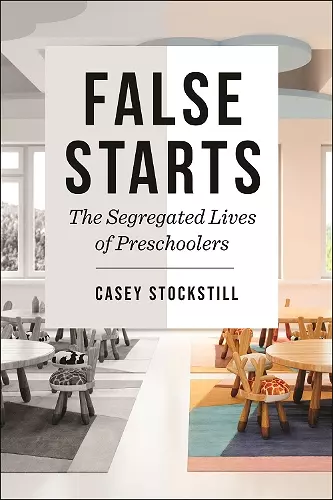False Starts
The Segregated Lives of Preschoolers
Format:Hardback
Publisher:New York University Press
Published:14th Nov '23
Currently unavailable, and unfortunately no date known when it will be back

Winner, 2024 Bourdieu Best Book Award, given by the Sociology of Education Section of the American Sociological Association
Honorable Mention, Outstanding Scholarly Contribution Award, given by the Children and Youth Section of the American Sociological Association
An inside look at the racial and class divides between Head Start and private pre-K classrooms for children and their families
The benefits of preschool have been part of our national conversation since the 1960s, when Head Start, a publicly funded preschool program for low-income children, began. In the past two decades, forty-four states have expanded access to preschool, often citing preschool as an anti-poverty policy. Yet, as Casey Stockstill shows, two-thirds of American preschools are segregated—concentrating primarily poor children of color or affluent white children in separate schools. Stockstill argues that, as a result, segregated preschools entrench rather than disrupt inequality.
Stockstill spent two years observing children and teachers at two preschools in Madison, Wisconsin. Madison, like many other small and medium cities in the United States, is segregated, with affluent and middle-class white people and working class or low-income people of color occupying different sectors of the city. Stockstill observed one preschool that was 95% white and another that was 95% children of color. She shows that this segregation was more than a background variable or inconvenient image; segregation had an impact on children’s experiences in multiple ways, but especially in the ways they spent their time, the supervision and instruction they received, and the ways they learned and socialized with other children. Stockstill shows that even in high-quality preschools that on paper have similar resources, de facto segregation creates different school experiences for children that ultimately reinforce racial and class inequality.
False Starts suggests that as we continue to invest in preschool as an anti-poverty policy, we need a fuller understanding of how segregated classroom environments impact children's educational outcomes and their ability to thrive.
Casey Stockstill’s False Starts exposes how racial inequality in the US begins in preschool. This is a thorough account of the history... [and] an enlightening study of the promises and obstacles of US preschools. * Foreword Reviews *
This is a compelling study of two preschools in Madison, Wisconsin, one 95 percent white students and the other 95 percent students of color. Adeptly illustrating that the segregation of students reflects and reinforces structural inequalities of racial and class divides, sociologist Casey Stockstill provides antidotes to decrease these inequalities as we seek to expand access. * Ms. Magazine *
Crisp storytelling and keen analysis... The brilliance of Stockstill’s work is in how she brings readers down from the abstract to nitty-gritty reality. Whether you are a child care veteran or new to the issue, you’ll walk away from False Starts buzzing with thoughts. -- Elliot Haspel * Early Learning Nation *
False Starts is an absolutely fantastic book. Beautifully written. Exceptionally researched. Accessible to a broad audience. Casey Stockstill has made daycare a necessary part of the conversation for cultural sociologists and the sociology of education. * Shamus Rahman Khan, author of Privilege: The Making of an Adolescent Elite at St. Paul’s School *
In this searing account, Stockstill shows how class and race inequalities are baked into children’s experience of preschool, shaping the lessons they learn about insecurity, property and privilege. False Starts documents that preschools are more than just places where individual kids get what they need, but instead complex sites of group socialization. * Allison J. Pugh, author of Longing and Belonging: Parents, Children and Consumer Culture *
When we think of segregated schooling, preschools are rarely top-of-mind; and yet, early
childhood education is, for most children, the most racially and socioeconomically segregated
schooling context they will encounter at any point in their lives. This is a must-read book for
anyone who wants to understand both the necessity of universal, high-quality preschool and the
challenges of getting it right.
Stockstill convincingly and painfully illustrates how young children’s lives are structured in unequal ways from the very start. False Starts is a much-needed and excellent addition to existing research on racism and poverty in the lives of kids and is a must-read for anyone engaged in current debates about childhood socialization, social learning, child care, and universal preschool. * Margaret A. Hagerman, author of White Kids: Growing Up with Privilege in a Racially Divided America *
Stockstill’s meticulous work reveals how concentrated poverty affects the distribution of time
and resources in the classroom, limiting students’ opportunity to learn in important ways.” Highly
recommended.
False Starts provides valuable insight into the consequences of the race and class segregation that characterizes early education in the United States, and how this segregation plays out in day-to-day classroom experiences...In addition to being an important contribution to the literature on stratification and early education, it will also appeal to early education policymakers and teachers, as well as anyone with current or future preschool- aged children. -- Hannah W. Espy * Social Forces *
False Starts covers remarkable breadth and depth...She deftly stitches together the interrelatedness between broader social structures and policies with the finer-grain, intimate phenomena of the classroom, down to the hidden action figures in children’s pockets. In this way, she illustrates how micro and macro forces work to reproduce inequality in preschool. * Harvard Educational Review *
False Starts does not disappoint. Stockstill offers a crucial intervention in the literature on school segregation, encouraging readers to re-examine fundamental assumptions in the field... I can’t wait to teach this book in my courses on educational inequality and qualitative research methods. Both undergraduate and graduate students will appreciate Stockstill’s clear argument and her engaging observations of classroom interactions. * Sociology of Race and Ethnicity *
ISBN: 9781479815005
Dimensions: unknown
Weight: unknown
232 pages